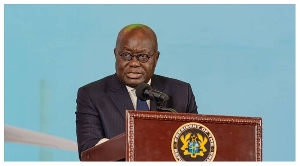Opinions of Thursday, 6 October 2005
Columnist: GNA
Let Us All Use The Commoner's Path
A GNA Feature by Samuel Osei-Frempong
Accra, Oct. 6, GNA - When the late Former Deputy Minister of Finance, Mr Victor Selormey inhaled the pungent odour of his cell, in prison for the first time, he remembered with regret the countless occasions he had avoided discussions on budgetary support for the Ghana Prison Service. A Prison Officer, who pleads anonymity, said before he was pardoned, Mr Selormey had wished for another chance at the Finance Ministry to help the Prisons, but he never had that opportunity. Mr Selormey died; but before his death, he had seen, with his very eyes, the indignity, suffering and sexual exploitation in the dark and narrow holes of Ghanaian prisons, made possible due to neglect by policy makers.
The late Krobo Adusei, a Minister of the Interior in the First Republic, who had the pleasure of supervising the incarceration of other politicians made a famous remark when he had his turn in the overcrowded prison: "If I knew I would come here one day, I would have made it a better place."
Many high-ranking officials, who at a point had to taste the life of the commoner and genuinely show remorse at their thoughtlessness never, get the opportunity to reverse the actions or inactions. Some lucky ones get the opportunity but soon forget the misery and deprivation on the path of the ordinary person. The distance between the policymaking and policy consumption in our part of the world appears to be so wide that most programmes or projects turn into waste.
There is a seeming philosophy that someone somewhere is best equipped to think better and take decisions for the people. Consultations done on numerous bills, programmes and projects turn out to be mere stagecraft aimed at getting words for the book. Instead of building bridges into the population, we love the walls that separate us and we would gladly avoid people because "they are always demanding something from us".
The fact remains that people would continue to ask for help from "their big men" if resources are not distributed in a way that the commoner could also benefit. If opportunities for education and other vital social services are limited, they are less potent not to ask for help. There is a subtle emerging segregation in the delivery of vital social services like education and health, which should be checked before it kills patriotism in the Ghanaian.
It would be very much appreciated if a legislation, which could be called the "Common Usage Bill", were enacted to document, regulate and enforce certain moral principles in our national life. In this proposed legislation, three main areas of service delivery would be highlighted and it is intended to draw the policymaker closer to the commoner so that local concerns would be experienced and not viewed from a distance.
All persons of the rank of Director in the public service to the President shall enrol their children in public schools. Their wards shall be in the local public schools until they complete their undergraduate studies.
This provision would help the public schools, where the bulk of the population seek education, restore their image and confidence needed to play their constitutional role in the development process. It would also bring about the needed attention and resources because those who would direct the expenditure of resources would have enrolled their wards in such schools.
The lack of or weak supervision and scant resources are the main problems of public schools. It should be stated that a public officer's commitment to the development of public facilities should be unquestionable.
The President's vision of making at least one senior secondary school a model school would be greatly enhanced when the "Big Men" in society patronise local schools. Another provision of this Bill would ask that all such persons identified earlier shall attend local hospitals with their families when they are sick.
The long queues that run the floors of our hospitals would certainly reduce if policy makers were made to feel the pain and anxiety the commoner goes through before seeing the face of a doctor.
Local hospitals would as a result of this policy attract the machinery and resources, which would have been spent on certain officials abroad. The establishment of the Cardio Centre at the Korle-Bu Teaching Hospital is a case in point. It has saved the country billions of cedis and continues to play a very vital role in the West Africa Sub-Region. The mere localisation of the treatment of heart- related diseases has given Ghanaians a feat to behold.
The other area is public transport. People in the category stated should be compelled to use public transport at least twice a week. Public officials should not also possess more than one official vehicle. They should be at liberty to negotiate the purchase of as many vehicles as their personal income would permit.
The long queues and the insolence of local drivers would be known by those who draft and implement policy. These are some of the concerns of the common man that need urgent attention.
The sanctions or rewards that would accompany such legislation could be debated. Ghana needs stronger measures to make the accountability and patriotism drive wholesome.
At this point in our national life, the commoner's appeal should clothe all national policies because at the end of the day, his highest peak would be the levelling ground for assessing the prosperity or otherwise of the citizenry. 6 Oct. 05












